
![]()
Search the Journey to Forever website – click HERE
|
Journey to Forever: Make a donation |
En español
Biocombustibles, biodiesel
Navigation
Contact usTo Keith Addison Handmade Projects |
Do diesels have a future?
Should the "dirty diesels" be scrapped once and for all in favour of cleaner technologies? There are those who think so, especially in the US -- but maybe they just haven't been paying attention. There's no such confusion in Europe, for instance.

An Oldsmobile diesel -- the notorious 5.7-litre 350 cubic inch GM diesel engine gave diesels a bad name in the US.
Diesel engines power 37% of all new cars sold in Europe (62% in France), with the share predicted to rise to 45% by 2005 -- but fewer than 1% of new American cars have diesel engines.
One reason is the poor quality of diesel fuel sold in the US. A 1998 report on fuel lubricity worldwide found that diesel fuel sold in the US and Canada is some of the poorest quality fuel in the world. Fully 50% of the US fuel was found to be below the standards recommended by equipment manufacturers.
http://www.biodiesel.org/pdf_files/fuelfactsheets/Lubricity.PDF
Big Oil has dragged it's feet in cleaning up diesel fuel in the US. Europe started producing cleaner, low-sulfur diesel fuel in 1990; the US plans to follow in 2006. And the new generation of clean diesels either can't meet the US emissions standards on the dirty US fuel, or they can't even use it. But they run just fine on biodiesel, with very low emissions.
For a possible view of the future, we have to look to the past. 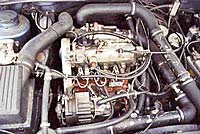 The Elsbett engine -- the 3-cylinder SVO (Straight Vegetable Oil) diesel motor designed by the late Ludwig Elsbett, was a highly advanced true multifuel engine, and the forerunner of all DI diesels made today. Details:
The Elsbett engine -- the 3-cylinder SVO (Straight Vegetable Oil) diesel motor designed by the late Ludwig Elsbett, was a highly advanced true multifuel engine, and the forerunner of all DI diesels made today. Details:
http://www.elsbett.com/
gd/eteche.htm
More detail (in German):
http://www.elsbett.com/gd/etech.htm
News article about a Mercedes fitted with the amazing Elsbett engine (120kb graphic file).
Diesel motor development is advancing very rapidly, with tremendous improvements in efficiency, economy, performance and emissions -- but not, as yet, in the direction of true multifuel motors that can run on petroleum diesel fuel, biodiesel, SVO, or any combinatioin of the three without modification and under full manufacturer's warranty. This is what the fast-growing international biofuels community is pushing for.
Meanwhile, there are signs of change in increasing use of diesels in the US:
"Panel tells EPA no technical problems getting sulfur out of diesel fuel" -- Washington, Associated Press, October 30, 2002: There are no technical problems that should prevent refiners from producing nearly sulfur-free diesel by 2006 when new requirements for the cleaner fuel go into effect, an advisory panel told the Environmental Protection Agency. The report by an independent review panel, whose members included both oil industry representatives and environmental advocates, concluded "there are no technological impediments" to refineries reducing the amount of sulfur in diesel from the current 500 parts per million to 15 parts per million.
http://www.signonsandiego.com/news/science/
20021030-1438-cleandiesel.html
 "Clean-Air Czar of California Shifts to Accept Diesel Engines -- In Controversial Turn-Around, Regulator Sees Diesel as Alternative in Global-Warming Fight" -- The Wall Street Journal, October 24, 2002: For years, Alan Lloyd has regarded diesel as a dirty word, synonymous with brown haze and cancer-causing black soot. It's a view he has shared with environmental activists across the U.S. But in a striking change of heart that could alter the kinds of cars and trucks Americans drive, the chairman of the powerful California Air Resources Board is taking a new look at diesel vehicles. He thinks they're poised to emerge as part of the solution to a different environmental problem that's gaining more attention in the U.S.: global warming... Here, diesel engines are the greener option because they don't pump out as much so-called greenhouse gas as gasoline engines do... Dr. Lloyd says he has concluded that a new generation of high-tech diesels developed for Europe bear little resemblance to the smoke-spewers that Americans remember from the 1970s and 1980s.
"Clean-Air Czar of California Shifts to Accept Diesel Engines -- In Controversial Turn-Around, Regulator Sees Diesel as Alternative in Global-Warming Fight" -- The Wall Street Journal, October 24, 2002: For years, Alan Lloyd has regarded diesel as a dirty word, synonymous with brown haze and cancer-causing black soot. It's a view he has shared with environmental activists across the U.S. But in a striking change of heart that could alter the kinds of cars and trucks Americans drive, the chairman of the powerful California Air Resources Board is taking a new look at diesel vehicles. He thinks they're poised to emerge as part of the solution to a different environmental problem that's gaining more attention in the U.S.: global warming... Here, diesel engines are the greener option because they don't pump out as much so-called greenhouse gas as gasoline engines do... Dr. Lloyd says he has concluded that a new generation of high-tech diesels developed for Europe bear little resemblance to the smoke-spewers that Americans remember from the 1970s and 1980s.
http://forums.biodieselnow.com/topic.asp?TOPIC_ID=294
See Diesels in the US
 "First Test: 2002 Ford Focus Tdci; Diesel-powered Pocket-rocket" -- Motor Trend (August 2002): Ford's 1.8L turbo-powered Focus isn't sold in the United States. That could change. Oil-burning Foci like this one -- borrowed from Ford's Scientific Research Laboratory in Dearborn, Michigan -- have been wowing Europeans for a year. Future California emission laws for particulates and oxides of nitrogen are posing stiff problems for the lab types. They say they have catalysts and other solutions that'll work, but only if the sulfur content in U.S.-spec diesel fuel is substantially reduced.
"First Test: 2002 Ford Focus Tdci; Diesel-powered Pocket-rocket" -- Motor Trend (August 2002): Ford's 1.8L turbo-powered Focus isn't sold in the United States. That could change. Oil-burning Foci like this one -- borrowed from Ford's Scientific Research Laboratory in Dearborn, Michigan -- have been wowing Europeans for a year. Future California emission laws for particulates and oxides of nitrogen are posing stiff problems for the lab types. They say they have catalysts and other solutions that'll work, but only if the sulfur content in U.S.-spec diesel fuel is substantially reduced.
http://www.motortrend.com/roadtests/wagon/112_0208_focus/index.html
"There is no argument anywhere in the auto industry that more low-sulfur diesel fuels are needed to help bring cleaner, advanced, direct-injection diesel engines to market in the United States." -- "The Debate Over Diesel", by Warren Brown, Washington Post, September 6, 2002
http://www.washingtonpost.com/ac2/wp-dyn?pagename=
article&node=&contentId=A45702-2002Sep6¬Found=true
"According to studies by both J.D. Power and Associates and the Diesel Technology Forum, roughly one third of Americans would consider a clean diesel, if given the option," says Kurt Liedtke, CEO of the Robert Bosch Corporation. He said by increasing diesel market share from one to 40%, the US will achieve $9 billion annual savings in oil consumption; average fuel economy of 28 miles per gallon (CAFE); greater independence from foreign oil sources; and 5 million metric ton decline in annual greenhouse gas emissions. -- "Diesels Are Ready. Why Aren't We?"
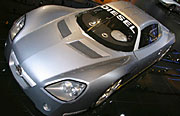
The Opel Eco-Speedster sports car prototype: The 1.3-litre Ecotec Diesel engine produces 112 hp, giving the car a maximum speed of more than 155 mph, and fuel consumption of 94 mpg (US), 2.5 liters per 100 km.
http://www.autointell.com/
News-2002/October-2002/
October-2002-1/October-02-02-p5.htm
http://www.boschusa.com/News/ViewNews.asp?NewsType=RA&ID=0
See: Diesel engine, as a "ready for use" energy saving technology -- by Hakan Falk at Energy Saving Now.
http://energy.saving.nu/biofuels/dieseltech.shtml
"Super Diesels!", Ward's Auto World, September 1, 2001
http://industryclick.com/magazinearticle.asp?magazineid
=50&releaseid=8418&magazinearticleid=118355&siteid=26
"European policymakers have recognized the environmental advantages of diesel, and have allowed new diesel vehicles to prove themselves as efficient, quiet and powerful alternatives. In America, growth in the market share of light-duty diesels would vastly reduce fuel consumption, foreign oil imports and greenhouse-gas emissions... Most interests in the auto industry -- in the US and abroad -- are beginning to wonder aloud if we, and the Bush Administration, do indeed have our priorities in order... With all things considered -- including customer-pleasing performance -- if the US ignores high-technology diesels in favor of its current fascination with HEV technology, we probably aren't backing the right horse...
"... PSA Peugeot Citroen has in production for the 607 HDI a silicon carbide honeycomb filter that accumulates particulate matter for between 200 and 300 miles (480 km), then the accumulated particulates are oxidized by injecting a small amount of fuel and a rare-earth-derived additive called Eolys to superheat the exhaust and burn off the particulates. The Eolys tank holds 1.3 gallons (5L) and requires refilling every 50,000 miles (80,000 km) or so. It is claimed to eliminate 95% of particulate emissions.
"Volkswagen AG is working on a novel 'engine-based' approach leveraging complex chemical and catalytic reactions to achieve the near-zero particulate emissions. And supplier and automaker R&D operations are running full-tilt to perfect prototype NOx-reduction technology like Toyota's promising Diesel Particulate-NOx Reduction (DPNR) catalyst, which also employs advanced chemical/catalytic processes to scrub out the last vestiges of diesel emissions nastiness..." (6,500-word article)
"Diesel engines could help US beat fuel crunch if feds wake up" -- Diesel engines, the hottest auto trend in Europe, are being regulated out of existence in the United States. -- Detroit News, 22 May, 2001
http://detnews.com:80/2001/autos/0105/22/b01-226787.htm
"Diesel will drive the 21st Century", says biodiesel fuel producer Southern States Power Co, reporting a worldwide change from petrol engines to "much more efficient" diesels. "The near-term future of transportation will be defined by new diesel technology."
http://www.sspowerco.com/
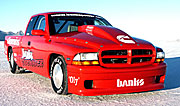 World's Fastest Pickup -- And It's A Diesel! Gale Banks's Sidewinder pickup passed through the speed traps of the Bonneville Salt Flats at 222.139 mph on Oct. 19, 2002. Banks's Dodge Dakota is powered by a modified 2003 5.9-liter Cummins turbodiesel straight Six that produces 735 hp and more than 1300 ft.-lb. of torque.
World's Fastest Pickup -- And It's A Diesel! Gale Banks's Sidewinder pickup passed through the speed traps of the Bonneville Salt Flats at 222.139 mph on Oct. 19, 2002. Banks's Dodge Dakota is powered by a modified 2003 5.9-liter Cummins turbodiesel straight Six that produces 735 hp and more than 1300 ft.-lb. of torque.
http://popularmechanics.com/automotive/
motor_sports/2002/11/worlds_fastest_pickup/
Gale Banks Engineering in Azusa, Calif.:
http://www.bankspower.com/Banks_Sidewinder/
sidewinder-news.cfm
DieselNet's Diesel Emissions Online says the "diesel engine is the most efficient power plant among all known types of internal combustion engines", and discusses "the clean diesel engine of the future".
http://www.dieselnet.com/
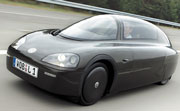 Leading the way: Volkswagen 1-liter Concept -- Hamburg, 2002: the world's first 1-liter car uses less than 1 litre per 100 km, 239 mpg. About the weight of a touring motorcycle (290 kg, 639 lb), the 1L seats two, has a single-cylinder 299cc diesel SDI motor, and does 120 kph -- 74 mph. Long, narrow and low-slung, it's a sporty car that's "fun to drive". It was designed in a wind-tunnel, and has the same standards of impact and overturning protection as a GT racing car. VW says it's suitable for everyday use and is "perhaps an indication of a totally new family of cars". The one-cylinder SDI engine has a 6-hole injection jet and pre-injection, two overhead camshafts and three valves, and high-tech lightweight construction, weighing only 38 kg (84 lbs) including the starter-alternator.
Leading the way: Volkswagen 1-liter Concept -- Hamburg, 2002: the world's first 1-liter car uses less than 1 litre per 100 km, 239 mpg. About the weight of a touring motorcycle (290 kg, 639 lb), the 1L seats two, has a single-cylinder 299cc diesel SDI motor, and does 120 kph -- 74 mph. Long, narrow and low-slung, it's a sporty car that's "fun to drive". It was designed in a wind-tunnel, and has the same standards of impact and overturning protection as a GT racing car. VW says it's suitable for everyday use and is "perhaps an indication of a totally new family of cars". The one-cylinder SDI engine has a 6-hole injection jet and pre-injection, two overhead camshafts and three valves, and high-tech lightweight construction, weighing only 38 kg (84 lbs) including the starter-alternator.
VW to relaunch 'one-litre' eco car, CAR Magazine, 30 June 2008 -- It's heading for production in 2010, two years ahead of schedule, as a 2-cylinder diesel hybrid.
http://www.carmagazine.co.uk/Green-Cars/Search-Results/Green-News/VW-to-relaunch-one-litre-eco-car/
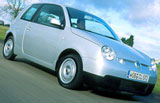 The diesel-powered Volkswagen Lupo 3L TDi is one of the most fuel-efficient cars in the world. It's called the "3L" because its official fuel consumption is below three litres per 100 km -- 94.1 miles per gallon. In 2000 a Lupo 3L went on a globe-trot. It covered 20,699 miles at an average speed of 53.1 mph on daily journeys of between 76 and 478 miles and used only 174.7 gallons of diesel -- an average of 118 miles to the gallon. The best fuel consumption recorded was 141.9 mpg, the worst 100.9 mpg. The Lupo 3L TDi is powered by a 1.2-litre 61bhp three-cylinder diesel engine with direct fuel injection. See "Volkswagen Lupo's record attempt in Australia":
The diesel-powered Volkswagen Lupo 3L TDi is one of the most fuel-efficient cars in the world. It's called the "3L" because its official fuel consumption is below three litres per 100 km -- 94.1 miles per gallon. In 2000 a Lupo 3L went on a globe-trot. It covered 20,699 miles at an average speed of 53.1 mph on daily journeys of between 76 and 478 miles and used only 174.7 gallons of diesel -- an average of 118 miles to the gallon. The best fuel consumption recorded was 141.9 mpg, the worst 100.9 mpg. The Lupo 3L TDi is powered by a 1.2-litre 61bhp three-cylinder diesel engine with direct fuel injection. See "Volkswagen Lupo's record attempt in Australia":
http://www.autoweb.com.au/start_15/showall_/
id_VWN/doc_vwg0006011/article.html
"Lupo 3L TDi Back In Wolfsburg":
http://www.diskdrive.co.za/newsstories/vw_lupo3ltdi.html
The Lupo also broke the round-Britain economy record, previously held by a standard Japanese Daihatsu Charade diesel at 103 mpg. Volkswagen engineers are working on a super-economical motor that could go 300 miles on only one gallon of fuel.
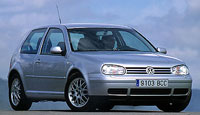 Volkswagen's 4-cyl. Golf GTI TDI 150 diesel blows away a lot of sporting cars, propelled by the most satisfying aspect of engine performance -- torque. More torque than a V-6 Jaguar. Diesels have torque in spades. The TDI 150 gets 40 mpg (5.9 L/100 km) and goes from 0-to-62 mph (100-km/h) in 8.5 seconds. Diesel power stormed from 14% of European new-car sales in 1990 to 33% last year, and they're expected to hit 50% by 2010. (From "Super Diesels!", Ward's Auto World, September 1, 2001)
Volkswagen's 4-cyl. Golf GTI TDI 150 diesel blows away a lot of sporting cars, propelled by the most satisfying aspect of engine performance -- torque. More torque than a V-6 Jaguar. Diesels have torque in spades. The TDI 150 gets 40 mpg (5.9 L/100 km) and goes from 0-to-62 mph (100-km/h) in 8.5 seconds. Diesel power stormed from 14% of European new-car sales in 1990 to 33% last year, and they're expected to hit 50% by 2010. (From "Super Diesels!", Ward's Auto World, September 1, 2001)
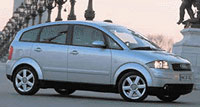 It Gets 78 Miles a Gallon, but U.S. Snubs Diesel, New York Times, Frankfurt, May 26, 2001 -- To judge by the mileage it can get, the Audi A2 sounds like just the kind of exotic hybrid-fuel car that President Bush would want to promote with his new energy plan. The sporty new four-door compact has a top speed of 100 miles an hour. It can travel 78 miles on a single gallon of fuel and emits fewer "greenhouse" gases than almost any other vehicle on the market. Yet the A2 has at its core a technology that generates scorn in the United States: the diesel engine. Diesel engines powered 32.3 percent, or nearly one-third, of all new cars sold in Europe last year, compared with 21.7 percent in 1997. Analysts predict the share will rise to at least 40 percent by 2005. The contrast with the United States could not be more stark. Fewer than 1 percent of new American cars have diesel engines.
It Gets 78 Miles a Gallon, but U.S. Snubs Diesel, New York Times, Frankfurt, May 26, 2001 -- To judge by the mileage it can get, the Audi A2 sounds like just the kind of exotic hybrid-fuel car that President Bush would want to promote with his new energy plan. The sporty new four-door compact has a top speed of 100 miles an hour. It can travel 78 miles on a single gallon of fuel and emits fewer "greenhouse" gases than almost any other vehicle on the market. Yet the A2 has at its core a technology that generates scorn in the United States: the diesel engine. Diesel engines powered 32.3 percent, or nearly one-third, of all new cars sold in Europe last year, compared with 21.7 percent in 1997. Analysts predict the share will rise to at least 40 percent by 2005. The contrast with the United States could not be more stark. Fewer than 1 percent of new American cars have diesel engines.
http://www.nytimes.com/2001/05/27/business/27DIES.html
"More Focus on Diesel", Sacramento Bee, June 1, 2001 -- In Europe, one of every three new cars sold today is powered by clean diesel technology and in the premium and luxury categories, over 70% are clean diesels. But in the US, light-duty diesels account for only about 0.26% of all new cars sold, with only slightly higher figures in the light-duty truck markets. It's completely understandable why clean diesel technology has such a high acceptance in Europe -- the engines provide more power, are more fuel efficient, are more durable, are extremely responsive with low-end torque, and have 30-60% lower greenhouse gas emissions.
http://www.dieselforum.org/news/aug_06_2001.html
Sacramento Bee
http://www.sacbee.com/
"Demand for Diesels: The European Experience -- Harnessing Diesel Innovation for Passenger Vehicle Fuel Efficiency and Emissions Objectives", Diesel Technology Forum (Acrobat file)
http://www.dieselforum.org/whitepaper/
downloads/EuropeanExperience.pdf
"GM pushes diesel revival" -- Automakers say new engines are cleaner, more fuel efficient. -- Detroit News, 21 May, 2001
http://detnews.com:80/2001/autos/0105/22/a01-226651.htm
"Diesel Engines Get Spotlight in Fuel-Efficiency Contest" -- New York Times, June 12, 2001
http://www.nytimes.com/2001/06/12/business/12DIES.html
Automakers see potential in diesel, Detroit Free Press, March 5, 2002 -- The diesel engine may have gone out of favor with the U.S. public in the early 1980s, but automakers, faced with increasing regulatory demands for fuel efficiency, are trying to bring it back in vogue. The 2002 Society of Automotive Engineers World Congress was the scene of a lovefest for the inclusion of diesel technology in the discussion of fuel economy and the future of the auto industry. "Modern diesel technology can answer many of the needs of our society," said Nick Scheele, chief operating officer at Ford Motor Co.
http://www.auto.com/industry/diesel5_20020305.htm
The US government/industry collaboration Partnership for a New Generation of Vehicles (PNGV), launched in 1993, was intended to reduce carbon dioxide emissions by developing ultra-clean, 80 miles-per-gallon (34 km/litre) "hypercars" without sacrificing comfort, safety or performance, focusing on cleaner and more efficient diesel engines.
General Motors' Precept achieved the mileage goal -- 80 miles per gallon. The car won the Popular Science "Best of What's New" Grand Award for automotive technology for 2000. The full-size five-passenger sedan was powered by two electric motors and a high-efficiency diesel. Its drag coefficient was just 0.16. GM said the Precept marked the leading edge of technology, and its design would have a strong influence on future cars. See GM's Precept Hybrid Gets 80 MPG:

The GM Precept -- 80mpg with super-clean diesel-electric power
http://www.popularmechanics.com/automotive/concept_cars/1267946.html
Chrysler's stylish Dodge ESX3 lightweight diesel-electric hybrid, part of the PNGV program, combined a direct-injection diesel with an electric motor and an advanced battery to achieve 72 miles per gallon (30 km/litre). The 5-seater body was made of thermoplastic -- the same cheap plastic used to make soft-drink bottles. Carbon dioxide emissions were 56% lower than a conventional petrol engine, with 50% less particulate matter than a conventional diesel and 70% less nitrogen oxides. Range was 420 miles (672 km). Unlike totally electric vehicles, hybrids have unlimited driving range and never need to be plugged in for recharging. See DaimlerChrysler unveils electric car:

Dodge ESX3
http://detnews.com/2000/autos/0002/23/02230070.htm
 Ford's bid for the car of the future was the P2000 Prodigy 5-seater sedan, an ultra-light diesel-electric hybrid that boosted fuel economy to 63 miles per gallon (27 km/litre) and was expected to qualify as an ultra low emissions vehicle. Part of the PNGV program. The 1.2 litre, direct injection diesel DIATA engine was 35% more efficient than an equivalent petrol engine. "Extremely fuel-efficient", and "A giant advance toward the production of lightweight, environmentally responsible vehicles with outstanding economy and emissions levels". See Ford Hybrid Electric Vehicle is on horizon:
Ford's bid for the car of the future was the P2000 Prodigy 5-seater sedan, an ultra-light diesel-electric hybrid that boosted fuel economy to 63 miles per gallon (27 km/litre) and was expected to qualify as an ultra low emissions vehicle. Part of the PNGV program. The 1.2 litre, direct injection diesel DIATA engine was 35% more efficient than an equivalent petrol engine. "Extremely fuel-efficient", and "A giant advance toward the production of lightweight, environmentally responsible vehicles with outstanding economy and emissions levels". See Ford Hybrid Electric Vehicle is on horizon:
http://www.autoworld.com/news/Ford/Ford_Hybrid.htm
The costs of the new hypercars came right down from that of the earlier prototypes, but were still higher than production models. Cost of the Dodge ESX3 PNGV diesel hybrid was down to about $27,500 by early 2000. See Super-High-Mileage Car Just a Concept, For Now, Washington Post, August 17, 2001:
http://washingtonpost.com:80/wp-dyn/articles/A25087-2001Aug17.html
Early in 2002 the PNGV program was axed by the Bush administration, to be replaced with the "FreedomCAR" program focusing on hydrogen fuel-cells -- not expected to produce tangible results for a decade or more. See Driving In Circles: New Fuel-Efficiency Initiative Is More PR Than Progress:
http://www.mail-archive.com/biofuel@sustainablelists.org/msg10943.html
Fool Cells - How Detroit Plays Americans For A Bunch Of Suckers
http://www.mail-archive.com/biofuel@sustainablelists.org/msg20667.html
See also the Mokhiber-Weissman review of Jack Doyle's book, Taken for a Ride: Detroit's Big Three and the Politics of Pollution:
http://lists.essential.org/pipermail/corp-focus/2000/000031.html
Technology developments arising from the PNGV program, largely paid for by US taxpayers, seem to have vanished. "All told, of the 129 technology achievements and innovations arising from the Precept program, 47 of them are global industry firsts and about 75 percent have some sort of potential core product application. Nearly 40 of those achievements and innovations are in the propulsion system alone," said GM at the time. Shelved, while Americans buy Insights and Prius's from Japan instead, and US fuel economy hasn't improved in more than 20 years. See: A Tale of Two Countries, by David Morris
http://www.alternet.org/story.html?StoryID=17333
 It's An ENIGMA, EV World, March 3, 2002 -- Who said you can't build a parallel hybrid with 20 miles ZEV range? Not the team at San Diego State University. A remarkable story of ingenuity, vision and determination that lead to the creation of San Diego State University's 80 mpg Enigma diesel-electric hybrid sports car, running on biodiesel.
It's An ENIGMA, EV World, March 3, 2002 -- Who said you can't build a parallel hybrid with 20 miles ZEV range? Not the team at San Diego State University. A remarkable story of ingenuity, vision and determination that lead to the creation of San Diego State University's 80 mpg Enigma diesel-electric hybrid sports car, running on biodiesel.
http://evworld.com/databases/storybuilder.cfm?storyid=312
San Diego State University College of Engineering Hybrid Electric Vehicle Team:
http://www.engineering.sdsu.edu/~hev/text.html
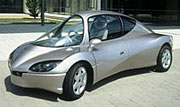 JetCar Version 2.5 -- The latest upgrade of the tandem, two passenger JetCar from Germany looks like a fighter but acts like a sailplane, sipping 2.1L/100 km of diesel fuel.
JetCar Version 2.5 -- The latest upgrade of the tandem, two passenger JetCar from Germany looks like a fighter but acts like a sailplane, sipping 2.1L/100 km of diesel fuel.
http://www.evworld.com/databases/
storybuilder.cfm?storyid=573
In German and English:
http://www.jetcar.de
Next-generation ultra-clean diesel engine -- "Pointing the Way to the Future of the Automobile": This Isuzu engine more than clears stringent domestic and international diesel engine exhaust emission standards, putting this low-emissions powerplant in the same class as future eco-friendly gasoline engines... This translates into a dramatic, simultaneous reduction of particulate matter (PM) and nitrogen oxide (NOx). The DPF and NOx catalytic after treatment assures even further reduction in emissions to alleviate environmental impact.
http://www.isuzu.co.jp/world/tms2001/engine.htm
 The BMW Alpina D10 Biturbo is claimed to be the fastest production diesel in the world with the best acceleration -- top speed is 254 km/h (touring: 251 km/h) or 159 mph (touring: 157 mph).
The BMW Alpina D10 Biturbo is claimed to be the fastest production diesel in the world with the best acceleration -- top speed is 254 km/h (touring: 251 km/h) or 159 mph (touring: 157 mph).
http://www.alpina.de/english/
automobiles/d10/d10_biturbo_e.htm
Onward March of Economical Diesels Is Unstoppable, Frankfurter Allgemeine Zeitung, Mar. 13, 2002 -- 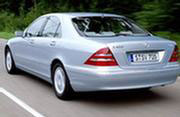 Diesel engines have become fashionable and, thanks to the dedicated progress made on direct injection, are now outstripping gasoline engines in the high-tech stakes. They have also become winners in the luxury segment, enjoying widespread popularity among men and women alike.
Diesel engines have become fashionable and, thanks to the dedicated progress made on direct injection, are now outstripping gasoline engines in the high-tech stakes. They have also become winners in the luxury segment, enjoying widespread popularity among men and women alike.
http://www.faz.com/IN/INtemplates/eFAZ/archive.asp?doc=
{58CEF733-A86D-4C4E-87A7-
98A5B2937888}&width=800&height=580&agt=netscape&ver=5&svr=5
Peugeot moves to gain green edge, The Guardian, February 20, 2002 -- PSA Peugeot Citroën, Europe's second largest motor manufacturer, is hoping to steal a march on rivals by bringing in the "greenest" diesel engines. The cars will be introduced to the British and European markets next year -- two years before the stringent new regulations on emissions known as Euro IV are due to become law. "This will mean diesel offers a real alternative to consumers as it removes any lingering concerns about particulate issues and capitalises on the fuel consumption and CO2 emission benefits of diesel technology," said Al Clarke of the Society of Motor Manufacturers and Traders.
http://www.guardian.co.uk/business/story/0,3604,653071,00.html
1.4 HDi Peugeot 206: "You would never know it was a diesel," said a British reviewer. "There was no smoke or rattle, just eager performance and a slick gear change, and most incredibly of all, a low fuel consumption of 73.3 mpg."
 The V6 diesel S-Type Jaguar, due for the showrooms in 2004, has a premium-class 2.7-litre V6 common-rail engine diesel engine developed by Ford/PSA Peugeot-Citroen to challenge BMW, Mercedes-Benz and Audi. The new V6 is the industry-first engine built using compacted graphite iron (CGI) technology instead of the conventional cast iron block. Peugeot and Citroen models (including the 807 and C8) will follow, and probably Land Rover and Volvo.
The V6 diesel S-Type Jaguar, due for the showrooms in 2004, has a premium-class 2.7-litre V6 common-rail engine diesel engine developed by Ford/PSA Peugeot-Citroen to challenge BMW, Mercedes-Benz and Audi. The new V6 is the industry-first engine built using compacted graphite iron (CGI) technology instead of the conventional cast iron block. Peugeot and Citroen models (including the 807 and C8) will follow, and probably Land Rover and Volvo.
http://www.tiscali.co.uk/motoring/firstimp/2003/06/09/story_1.html
"IEA Study Sees Clean-diesel As Low-cost, Rational Urban Transportation Strategy" -- World Fuels Today (August 19, 2002) Harrisburg, PA: The International Energy Agency (IEA) this month will release a new study, "Bus Systems for the Future", recommending a more rational approach to urban transport and emissions reduction. Clean-diesel gets a high rating. Rather than pushing high-cost, knee-jerk schemes such as compressed natural gas (CNG) buses or high-cost Metro subways as the supposedly "green" universal solution to urban transport problems, IEA's exhaustive study instead finds that cities should take a more cost-effective 'technology ladder" approach to solving clean urban transport problems. The study takes note of the side-by-side cost comparisons done by big transit agencies with lots of real world experience, such as Los Angeles, New York and Paris. These agencies all find that clean-diesel is far more cost-effective than CNG.
http://www.greendieseltechnology.com/news140.html
"Bus Systems for the Future, Achieving Sustainable Transport Worldwide" 188 pp. (61 02 1 P1) ISBN 92-64-19806-7, Price $US 100 ¤ 110
http://www.iea.org/public/studies/bus.htm
 http://www.lmcontrolsystems.com/PowerDrive.htm
http://www.lmcontrolsystems.com/PowerDrive.htm
Lockheed Martin's revolutionary HybriDrive diesel-electric hybrid engine for heavy-duty vehicles -- including urban buses and army trucks -- cuts emissions and fuel consumption.  It accelerates faster and smoother and runs quieter than a conventional diesel. "This system is capable of significantly reducing emissions, while improving performance and reducing maintenance costs." See:
It accelerates faster and smoother and runs quieter than a conventional diesel. "This system is capable of significantly reducing emissions, while improving performance and reducing maintenance costs." See:
http://caddet-ee.org/newsdesk/nw398_02.htm
 The US Army's hybrid diesel-electric "stealth" Humvee moves silently, uses much less fuel than its conventional diesel predecessor and accelerates like a sports car.
The US Army's hybrid diesel-electric "stealth" Humvee moves silently, uses much less fuel than its conventional diesel predecessor and accelerates like a sports car.
 The vehicle has four 100 hp UQM Technologies permanent magnet motors to provide power to each wheel and a fifth as a generator on the diesel powerplant. It has twice the acceleration and climbing capability of a conventionally powered Hummer. And, like a tank, it can turn around in place by having one or more wheels turn in different directions.
The vehicle has four 100 hp UQM Technologies permanent magnet motors to provide power to each wheel and a fifth as a generator on the diesel powerplant. It has twice the acceleration and climbing capability of a conventionally powered Hummer. And, like a tank, it can turn around in place by having one or more wheels turn in different directions.
http://www.uqm.com/Technologies/programs/hummer.html
General Motors will produce a full-size pickup truck featuring a hybrid powertrain beginning in 2004. GM full-size hybrid pickup trucks, versions of the popular Chevrolet Silverado and GMC Sierra, will deliver top performance with nearly 15% better fuel economy. GM and its Allison Transmission Division will begin delivery this year of a "hybrid" powertrain for transit buses. The hybrid bus powertrain was designed and developed by GM Allison Transmission Division based in Indianapolis. The GM Allison system will offer 50% better fuel economy compared with a conventional diesel-engine transit bus. The system also will cut nitrogen oxide emissions by 50%, while cutting particulate, hydrocarbon and carbon monoxide emissions by 90%, when fueled with low-sulfur fuel -- or, better, with biodiesel.
http://www.evaa.org/Newsmenu/News_Releases/PR080200/pr080200.html
Green Diesel Technology Vehicles Meet EPA Rule For Cleaner Diesel Trucks And Buses -- International and Engine Corporation, July 27, 2001: EPA Deputy Administrator Linda Fisher today recognized the recent certification of International Truck and Engine Corporation for its Green Diesel Technology school buses to be used in California. With this certification the corporation has demonstrated that it is possible to meet the heavy-duty diesel particulate emission standards well in advance of the 2007 model year requirements.
http://www.greendieseltechnology.com/news83.html
The General Motors Duramax is a lightweight and fuel-efficient engine that signals a new era in light truck design. The turbocharged 6.7-liter engine, the world's most powerful diesel, produces 300 horsepower and 520 pound-feet of torque, which makes towing a cinch. The direct-injection engine runs so smoothly that it's nearly free of diesel clatter. It is available in the new Chevrolet Silverado and GMC Sierra 3500-series pickups.
http://www.generalmotors.com/company/news_events/
events/chicago00/e/concept/terradyne/function.htm
Isuzu Motors will launch a small hybrid truck in 2002. The truck, a two-ton capacity model based on the Isuzu Elf, will be powered by an electric motor and a diesel engine. By using a hybrid-propulsion system, Isuzu hopes to lower emissions, particularly carbon dioxide, and increase fuel-efficiency. Isuzu will share the hybrid technology with General Motors, which owns a 49% stake in Isuzu.
BMW to buy Toyota engines -- Tokyo, September 14, 2001: German luxury carmaker BMW has reached a basic agreement with Toyota Motor Corp to buy up to 30,000 diesel engines a year from Japan's biggest automaker.
http://www.planetark.org/dailynewsstory.cfm/newsid/12401/story.htm
Isuzu to make diesel engines for Renault -- Tokyo, August 30, 2001: Japan's Isuzu Motors Ltd will supply French automaker Renault SA with three-litre direct fuel injection diesel engines from the start of next year. Renault confirmed that it would outsource production of the engines for use in its Versatis luxury cars due out around the end of the year. Isuzu would supply between 10,000 and 20,000 engines a year for use in Renault's luxury car, capitalising on its expertise in the use of aluminium parts to make the three-litre engines lighter and more efficient.
http://www.planetark.org/dailynewsstory.cfm/newsid/12215/story.htm
Daimler, Mitsubishi to make eco-friendly engines -- Tokyo, August 8, 2001: Auto giant DaimlerChrysler and its Japanese partner Mitsubishi Motors Corp will jointly develop environmentally friendly diesel engines for medium-sized to large trucks. DaimlerChrysler aims to cut costs and save time in developing diesel engines to meet tightening global emissions standards. Together, the two companies produce 370,000 buses and trucks every year, the most in the world. The venture could also include South Korea's Hyundai Motors.
http://www.planetark.org/dailynewsstory.cfm?newsid=11935
See also Diesel motorbikes
Old diesels
But what about the millions of existing "old-tech" diesel vehicles that power the world's transport fleets? Converting them to the clean, new technology will be a slow and costly process -- and meanwhile they'll continue belching clouds of poisons from their exhausts.
But diesels are by far the most economical and efficient engines, and the world's transport industries rely on them. Scrapping the diesels would raise the costs of just about everything and make everyone's life tougher.
This is where biodiesel and other clean fuels have a role to play -- biodiesel can cut diesel emissions now, at no extra cost, and without having to do anything except put it in the tank.
US biodiesel producer Southern States Power Co (SSPC) demonstrated biodiesel to Mexico's EPA in January 1999 using an aging 1972 diesel truck that belched black smoke -- typical of the many old heavy-duty trucks in Mexico City. "When the biodiesel fuel reached the engine, the exhaust became clear with no black smoke." The results were "nearly identical to results obtained by the US federal government using similar blends of soybean oil and regular diesel fuel".
http://www.sspowerco.com/
Meanwhile, the Environmental Protection Agency in the US plans to lower the sulfur levels in diesel fuel from the current 500 parts per million (ppm) to less than 15 ppm. But this will destroy the lubricity of the fuel -- important in diesel engines because diesel engine parts are lubricated by the fuel itself. Only the newest motors will be able to use the new ultra-low-sulfur fuel. This is an opportunity for biodiesel, says executive director of the US National Biodiesel Board Joe Jobe. "Biodiesel is an excellent lubricity additive. Adding one percent biodiesel improves the lubricity up to 65 percent." And biodiesel contains no sulfur. See Biodiesel Development Corporation -- Biodiesel: Cost Effective Lubricity Enhancer:
http://pipeline.to/biodiesel/
Quotes
"Diesel engines today are 500% cleaner than they were just 20 years ago."-- Chrysler
"Pollution from diesel cars has been cut by 80 to 90% over the past two decades."-- Union of Concerned Scientists
"Particulate emissions from diesel-fuelled engines have been reduced by 90% over the past decade." -- Engine Manufacturers Association
"Direct injection diesel four-stroke engines add up to 12 miles per gallon (5 km/litre) -- or 24% increased efficiency -- over gasoline engines in a large car." -- Chrysler
"Compared to a gasoline engine, a direct injected diesel engine reduces carbon dioxide emissions by as much as 56%." -- Chrysler
"Today's best diesel passenger vehicles are more efficient than their gasoline counterparts, reducing carbon emissions by roughly 30%." -- Union of Concerned Scientists
"The most significant challenge is nitrogen oxides and particulate emissions. Future diesel engines will have to be four to eight times cleaner than they are today." -- Chrysler
"Pollution from diesel cars must be reduced another 75 to 90% within the next few years." -- Union of Concerned Scientists
"Current (PNGV) design criteria call for an 80% reduction in nitrogen oxide emissions compared to current diesels, and a 50% reduction in particulate emissions. This is well beyond current regulatory requirements." -- former US Vice President Al Gore
"Compression-ignition (diesel) direct-injection engines potentially meet regulatory requirements for emissions while maintaining their traditional advantages of reliability, high efficiency, durability, and competitive cost." -- US Partnership for a New Generation of Vehicles (PNGV)
There are still those who claim diesels are outdated technology. Read about what happened to one of them.
See also The best car in the world
Biofuels
En español -- Biocombustibles, biodiesel
Biofuels Library
Biofuels supplies and suppliers
Biodiesel
Make your own biodiesel
Mike Pelly's recipe
Two-stage biodiesel process
FOOLPROOF biodiesel process
Biodiesel processors
Biodiesel in Hong Kong
Nitrogen Oxide emissions
Glycerine
Biodiesel resources on the Web
Do diesels have a future?
Vegetable oil yields and characteristics
Washing
Biodiesel and your vehicle
Food or fuel?
Straight vegetable oil as diesel fuel
Ethanol
Ethanol resources on the Web
Is ethanol energy-efficient?